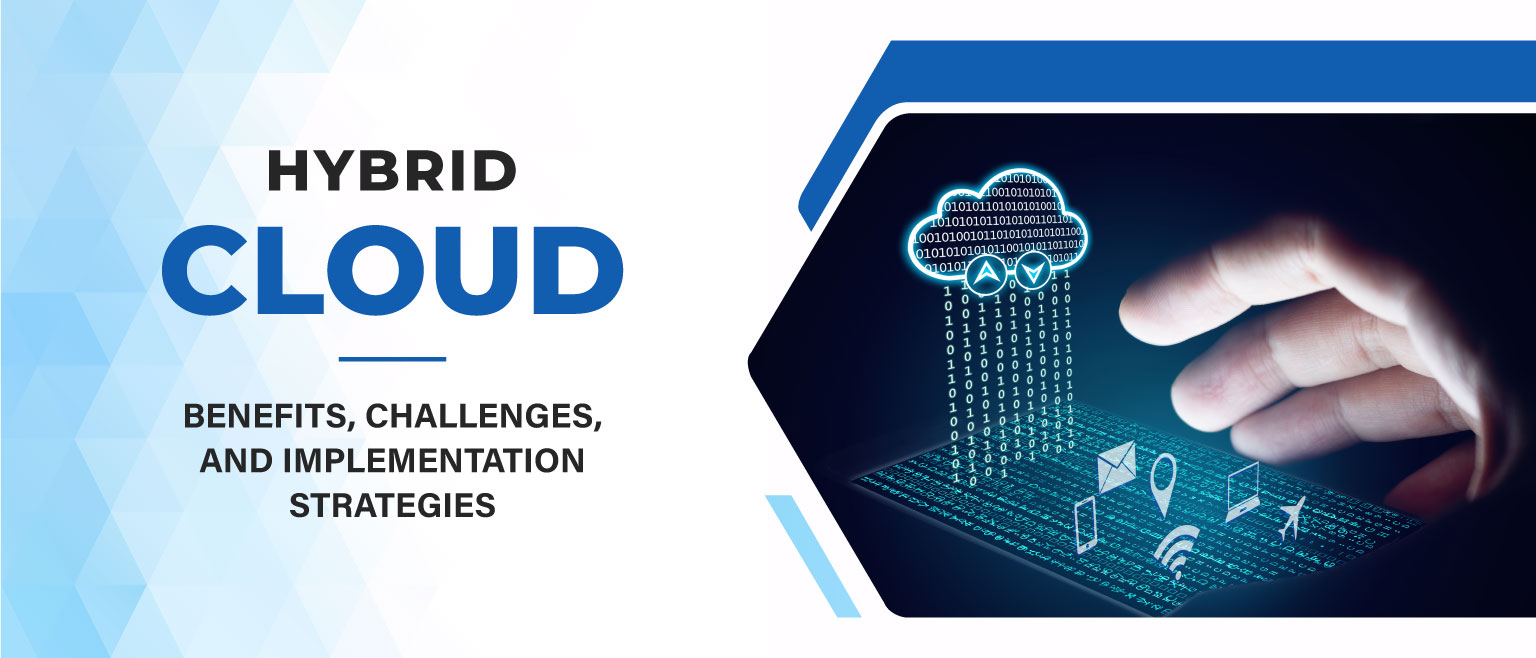Hybrid Cloud Computing Solutions: Benefits, Challenges, and Implementation Strategies
In today’s rapidly evolving technological landscape, businesses are presented with an array of options when it comes to their computing needs. One solution that has emerged as a game-changer is hybrid cloud technology—an innovative and strategic approach that marries the strengths of private and public cloud infrastructures. This dynamic fusion empowers organizations to harness the best of both worlds, all while tailoring their strategies to meet their unique needs and demands.
Through this blog, let us explore the benefits, challenges, and implementation strategies associated with hybrid cloud:
What is a Hybrid Cloud?
Combining elements of both private and public clouds, a hybrid cloud computing solutions offers a unique computing environment where data and applications can be shared seamlessly. A conventional setup usually involves a private cloud to handle critical workloads while a public cloud is utilized for less sensitive tasks or to manage spikes in demand.
Benefits of Hybrid Cloud Computing Solutions
According to a report commissioned by Google, there was a substantial surge in the adoption of hybrid cloud solutions, with usage spiking from 25% to an impressive 42.5% throughout the year 2022. This remarkable increase signifies a growing recognition among businesses and individuals alike of the immense potential and versatile applications that hybrid cloud solutions offer.
As organizations continue to navigate the complexities of modern technology landscapes, the appeal of hybrid cloud solutions as a strategic tool for optimizing operations, enhancing flexibility, and ensuring robust security measures becomes increasingly evident.
Let’s find out the benefits that the hybrid cloud provides that are helping in shaping the future of digital infrastructure in an organization:
- Flexibility: Hybrid cloud offers the flexibility to choose where to host different workloads based on factors such as security, compliance, and performance.
- Elasticity: Hybrid cloud services provide on-demand elasticity for applications with unpredictable usage patterns.
- Automation: Hybrid cloud supports effective scalability via automation. Infrastructure as Code (IaC) and orchestration tools can automatically provision and de-provision resources as demand fluctuates. Automation helps ensure that scaling is rapid, consistent, and error-free.
- Cost Efficiency: Hybrid cloud enables cost optimization by allowing you to balance resource usage between on-premises infrastructure and public cloud services.
- Security and Compliance: Organizations can keep sensitive data on-premises or in a private cloud to maintain security and compliance, while still benefiting from the agility and cost-effectiveness of public cloud services.
- Disaster Recovery: Hybrid cloud can facilitate robust disaster recovery strategies. The applications can be replicated in the public cloud, providing a reliable backup and recovery solution in case of on-premises failures.
Challenges of Hybrid Cloud Computing Solutions
On one hand, hybrid cloud computing solutions offer a myriad of benefits but on the other hand, they do come with their own set of challenges. The complexity that it comes with leads to reduced visibility, making it harder for security teams to monitor and manage the entire infrastructure effectively.
- Complexity: Managing and integrating resources across different cloud environments can be complex.
- Data Integration: Data migration, synchronization, and maintaining data integrity are crucial considerations.
- Security Concerns: The hybrid cloud introduces potential vulnerabilities in both the private and public cloud components, such as securing data during transit between environments and managing access controls consistently.
- Cost Management: While hybrid cloud can offer cost savings, improper resource allocation, and management can lead to unexpected expenses. It’s essential to monitor and manage resource usage effectively.
Implementation Strategies
As organizations continue to adopt hybrid cloud deployment models, it becomes imperative to implement robust strategies and solutions to address these complexities and ensure seamless operations across both on-premises and cloud-based environments. Let’s explore a few:
- Assessment: Evaluate your existing infrastructure, applications, and workloads to determine which components are suitable for public cloud hosting and which should remain on-premises.
- Architecture Design: Design a hybrid cloud architecture that suits your organization’s needs. Consider factors such as data flows, security measures, and integration points.
- Integration Tools: Implement integration tools and solutions that facilitate communication and data movement between on-premises and cloud environments. This could involve APIs, hybrid integration platforms, and specialized services provided by cloud vendors.
- Security Measures: Implement a robust security strategy that covers both on-premises and cloud environments. This includes encryption, access controls, identity and access management, and monitoring.
- Management and Monitoring: Employ cloud management and monitoring tools to oversee resource usage, performance, and cost. This helps in maintaining efficiency and identifying potential issues.
- Testing and Optimization: Test your hybrid cloud setup thoroughly before deploying critical workloads. Continuously optimize resource allocation to ensure cost-effectiveness and performance.
- Training and Skill Development: Ensure that your IT team has the necessary skills to manage both on-premises infrastructure and cloud services effectively. This might involve training or hiring personnel with expertise in hybrid cloud environments.
In conclusion, a hybrid cloud is a powerful and versatile computing platform that can offer organizations a wide range of benefits of both private and public cloud deployments. However, it is important to be aware of the challenges associated with various ways of cloud deployment options considering security, compliance, complexity, and cost. By carefully evaluating, planning, and implementing a hybrid cloud strategy, organizations can mitigate the need to maintain both private and public clouds.
Related Blogs
Digital Transformation of Manufacturing Industry towards Industry 5.0
The manufacturing sector has either played a key role or led industrial revolutions that the global economy has witnessed. During industrial 4.0 manufacturing industry has increased its level of automation,…
Generative AI in Telecom Industry for a Connected Future
Telephone companies (Telcos) have been struggling for years with insipid growth. Has the quest for catalysts to propel growth reached a tipping point amidst the rise of Generative AI in…
Myths and Truths about Digital Transformation
What is Digital Transformation? Is there one technology that fits all problems? The answer is ‘No’. Is it a quick fix for all Business Transformation solutions? The answer is still…





